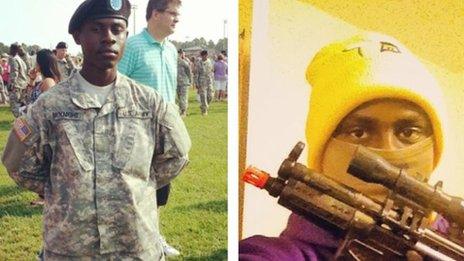Michael Brown killing: Vigils across US
- Published
BBC's Aleem Maqbool describes the "extraordinary scenes" in Missouri after state police took charge of security
Thousands of people have held vigils across the US in honour of a black teenager killed by police in Missouri.
Moments of silence and protests were held in New York, Chicago, Atlanta and elsewhere, five days after Michael Brown, 18, was fatally shot.
After four nights of violence in Ferguson, Missouri, where he died, state police took charge of security.
In contrast on Thursday evening, state troopers and local police walked with protestors, shaking their hands.
Captain Ronald Johnson of the Missouri Highway Patrol, an African-American who grew up nearby, was named as the new head of the operation.
As he walked at the front of a march through the streets, he was seen hugging people he met. "We all want justice. We all want answers," he said.

At the scene: Aleem Maqbool, Ferguson
The transformation over the past 24 hours here has been extraordinary. For days, there had been unrest and confrontation between a largely white police force and young, black protesters.
But the images of police in military gear and armoured vehicles out in Missouri shocked many Americans, led to criticism from officials, and clearly led to a change in tactics. Overnight the police presence was minimal. Black officers took the lead and were greeted with handshakes by people who poured onto the streets, now without fear of intimidation.
They stayed there well into the night, in something of a united, celebratory mood. They feel they have brought about a change in their community, and say they will no longer accept what they saw as police bullying and humiliation.

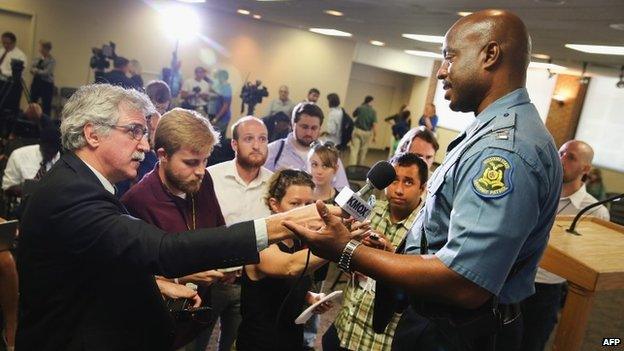
The new man in charge, Capt Ronald Johnson, meets reporters
People raised their hands in New York, Chicago, San Francisco and Dallas for Michael Brown on Thursday
For the first time, the reverberations from this Midwest town were felt nationwide with dozens of vigils organised by a social media campaign.
The event in Washington DC was attended by hundreds of people in Malcolm X Park, many holding placards saying: "Hands up. Don't shoot".
Similar vigils were held in New York, Boston, Detroit, Chicago and many other cities.
They came at the end of a day when Missouri Governor Jay Nixon had likened the scenes of violence in Ferguson to a "war zone" and the police conduct was questioned.
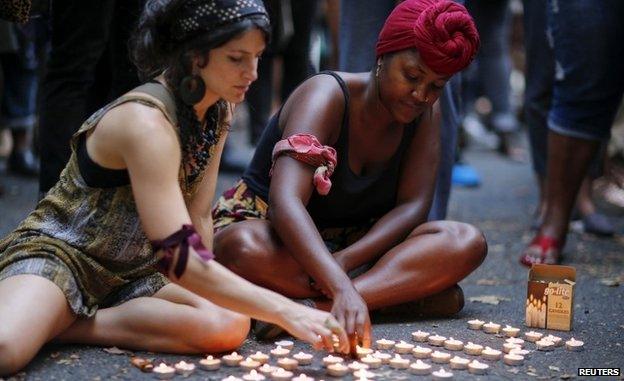
Brooklyn held one of several New York vigils
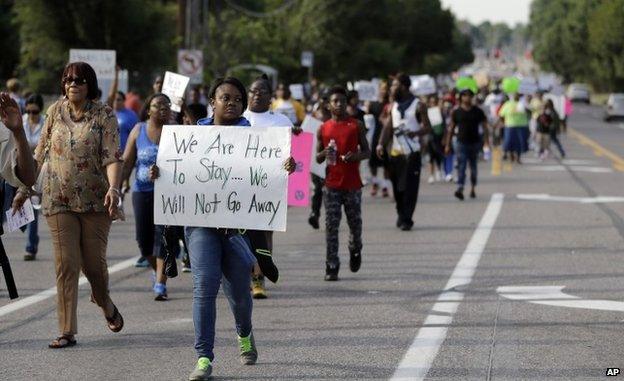
A march in Ferguson early on Thursday evening had a police escort
US Attorney General Eric Holder said the use of military equipment and vehicles in Ferguson had sent a "conflicting message", while President Barack Obama said there was no excuse for police using "excessive force".
The governor then announced that the state highway patrol would direct the security operation. "We're going to have to regain trust," he said.
Hours later, reporter Wesley Lowery of the Washington Post summed up the change in atmosphere on the streets of Ferguson.
"At this time at night on Monday, residents were in real fear for their lives," he said. "Tonight they're taking selfies with cops."
One protester, Pedro Smith, said: "All they did was look at us and shoot tear gas. This is totally different. Now we're being treated with respect."
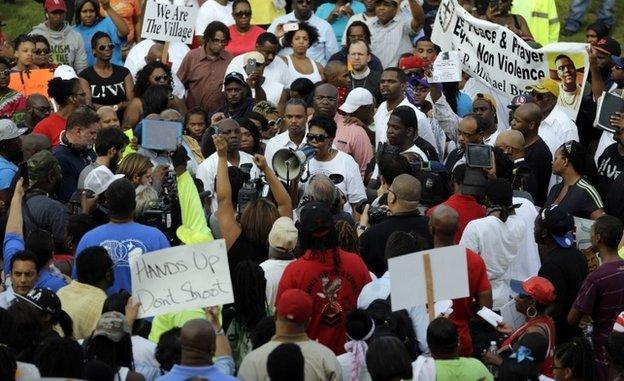
Hundreds gathered on Thursday evening at the spot where Michael Brown died
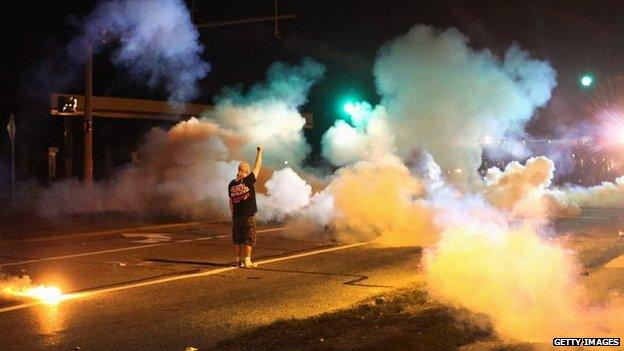
Tear gas was used to disperse protesters on Wednesday night
The tension in Ferguson had been sparked by the death of Brown, 18, on Saturday afternoon.
Details about the incident have been disputed but eyewitnesses said the unarmed teenager had his arms raised when he was shot multiple times by a police officer.
Eric Davis: "My cousin was murdered. He was executed"
Police say there was a struggle and the officer suffered facial injuries.
Brown's cousin, Eric Davis, told the BBC's Aleem Maqbool that the officer must be prosecuted, adding: "The police situation has always been one of distrust and not good for African-Americans."
The authorities are under pressure to release the officer's name, but they say they are worried that his life and that of his family could be in danger.
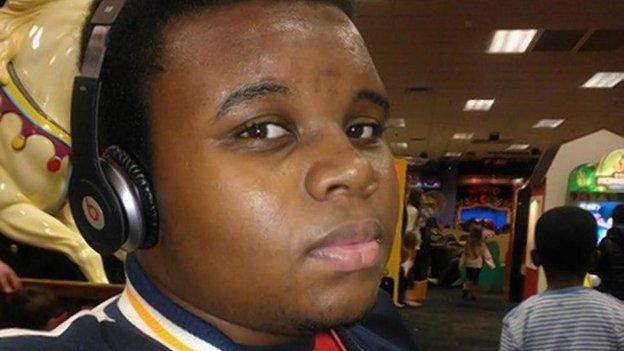
Michael Brown had recently graduated from high school
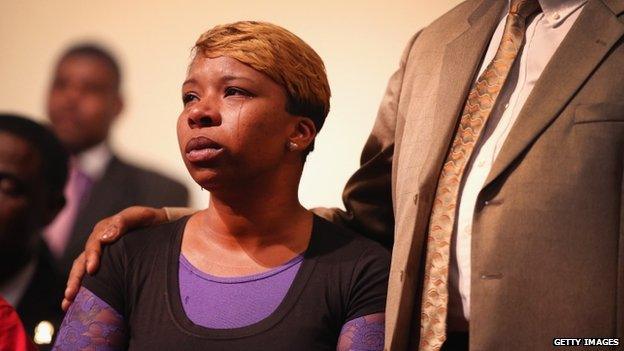
Michael Brown's mother, Lesley McSpadden, during a community meeting on Tuesday
Four nights of violence have seen heavily armed riot police firing tear gas at demonstrators and looting, arson and the throwing of bottles and Molotov cocktails.
In a specially convened press conference during his holiday, Mr Obama said there was "no excuse" for police to use excessive force against peaceful protesters.
But he also recognised the violence and criminal behaviour police had faced since Mr Brown's killing.
Mr Obama has promised a full investigation by the US Department of Justice into the teenager's death, and the FBI has launched its own inquiry.
- Published15 August 2014
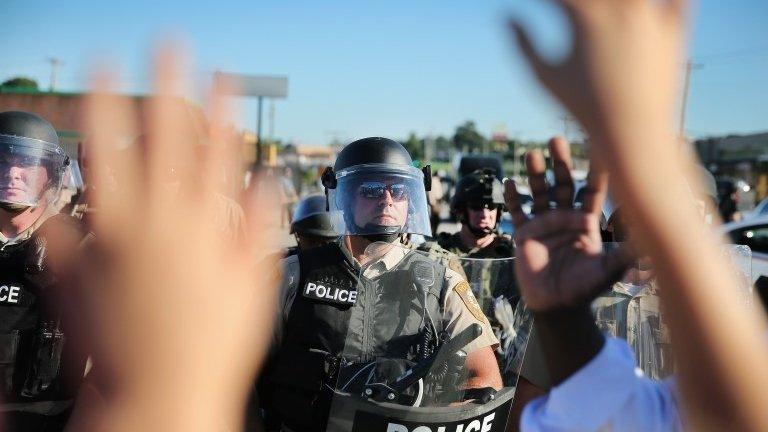
- Published14 August 2014
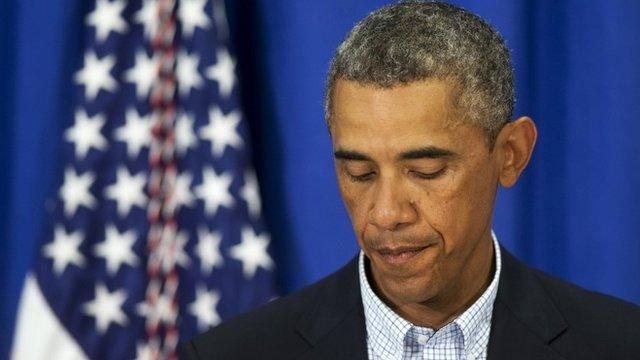
- Published14 August 2014
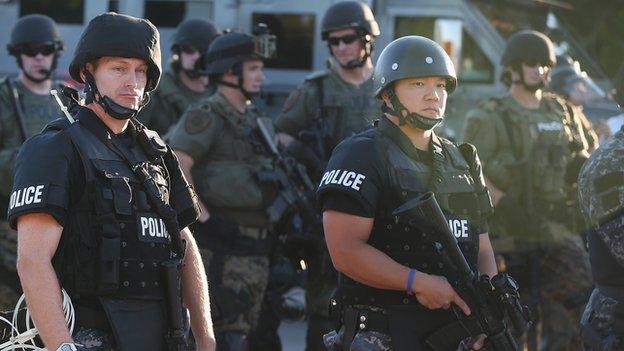
- Published14 August 2014
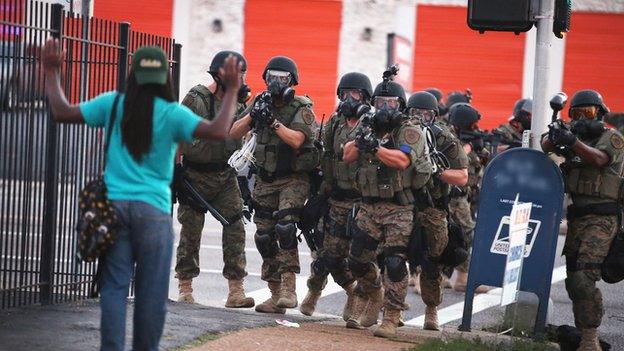
- Published11 August 2014
